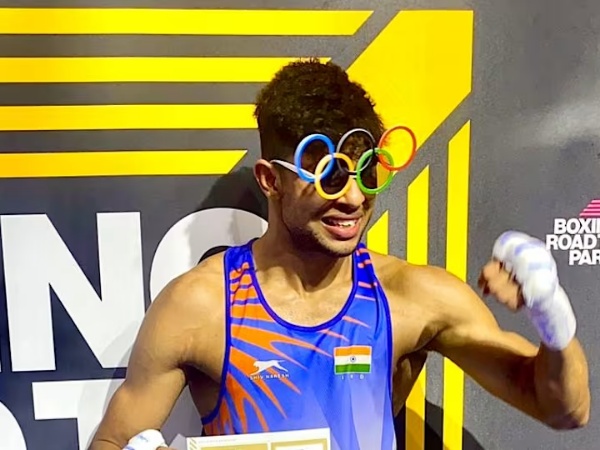Boxing officials divert attention by blaming boxers and reliance on foreign coaches
It has taken a long time coming, the Boxing Federation of India’s (BFI) review of the national team’s performance in the Paris 2024 Olympic Games. But when it did at a special general meeting, it seemed to skim the surface rather than be a deep dive into the reasons for the poor returns – only one Indian, Nishant Dev, making it to the quarterfinals.
A report in The Times of India has said BFI identified Amit Panghal’s diminished competitive spirit, Tokyo 2020 Olympic Games bronze medalist Lovlina Borgohain showing minimal progression, Nihkat Zareen and Jaismine Lamboria being overwhelmed by Olympic pressure while marking out Nishant Dev and Preeti Pawar’s potential.
As per that report, the sport’s leaders seem to believe that one of the biggest factors that led to an underwhelming performance is the evaluation system that Dunne introduced for team selection. Besides, they held that excessive reliance on foreign coaches and reduced confidence in Indian coaches also contributed to the team returning empty handed from Paris.
If indeed the ‘excessive’ reliance on overseas coaches and the reduced confidence in home grown coaches are causes for the decline in performances in the Olympic Games, the question that begs asking is quite simple. What led to such a deadly combination working together to knock the team cold?
It does not take much to find the answer. It is the BFI which looks out for foreign coaches. It is the Federation that decides which Indian coaches are given the responsibility of guiding the national team alongside these overseas personnel. It is the BFI that gets or not the overseas coaching staff to raise the bar for the Indian coaches by sharing its knowledge.
The BFI introspection seems to have totally overlooked the fact that while a month-long camp was held for the team in Saarbrucken, Germany, Amit Panghal was allowed to train on his own in Shillaru, Himachal Pradesh. Nor has it looked at the contribution of the six coaches and eight other support staff who accompanied the six boxers to the Olympic Games.
The Federation has apparently called for greater synergy between foreign coaches and home grown coaches. While it seems to have identified this as an area of concern during Bernard Dunne and Dmitri Dmitruk’s tenures as foreign coaches, it is not immediately clear how the Federation plans to achieve this.
Dunne and BFI parted ways in March 2024 after the Indian team had poor returns from the World Olympic Boxing Qualification Tournament in Italy, throwing the Olympic preparation in disarray. Some damage control was attempted by getting Dmitri Dmitruk to oversee the training but clearly that was never going to be enough, not with just a few months left.
Interestingly, it appears that while Dunne left in March, Boxing Federation of India paid him his contracted amount for six more months. Minister of Youth Affairs and Sports Mansukh Madaviya’s response to a question in the Rajya Sabha on December 5 last reveals that the High Performance Director was paid 11250 Euros each month till September 30.
It would appear that Dunne tried to change the culture, but perhaps he tried to overhaul too many things in too little time. Cultural change cannot be ushered in just like that. The learning from the saga is that the Federation needs to have extensive conversations with potential coaches and support staff before they are entrusted with the responsibility of the national teams.
Besides, BFI cannot simply appoint personnel and look the other way until it is too late. If a High Performance Director was attempting to drastically change the culture with his methods, why would Federation officials not step in and advise him to do it mindfully?
The bigger learning is that if India wants to court more success at the highest level, it must have a system that encourages a more professional approach. It must be designed to run with the Olympic cycle of four years, even though Boxing’s future in Olympic Games is shrouded in uncertainty. It must foster a stronger culture than is possibly obtained at the moment.
The sport’s leaders appear unwilling to introspect on areas of improvement that concern them. If they do, they will discover that change is a result of a lot of things, not the least being circumstances, some which are beyond their control. How Indian boxing evolves from the consequences of the present will determine its success in the future.
Unsurprisingly, there was no mention of Parveen Hooda’s three whereabouts failures that led her to being banned for 22 months from May 2024. Someone in the Federation, entrusted with the task of reading e-mails from the International Testing Agency that had placed Parveen Hooda on the Registered Testing Pool failed big time and the country had to pay a heavy price.
Not only is she ineligible to compete till July 16 this year, but also her results from December 11, 2022, to May 17, 2024, have been disqualified. These included the 57kg class bronze medal she won in the Hangshou 2022 Asian Games held in 2023. There has been radio silence on this subject with nobody in the Federation owning up responsibility for this colossal lapse.
